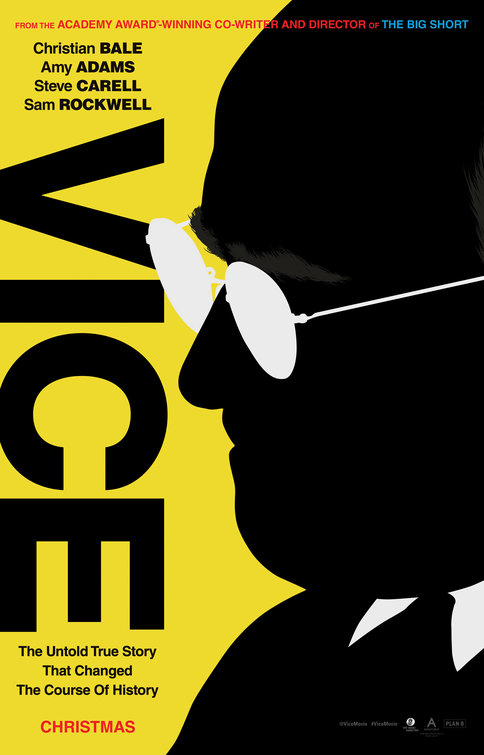The Untold Story That Changed The Course Of History
Director
Adam McKay
Starring
Christian Bale
Jesse Plemons
Amy Adams
Steve Carrell
Sam Rockwell
Bouncing back and forth between formative events, we are shown the life and political times of former US Vice President Dick Cheney [Bale]. Narrated by a fictional Iraq/Afghan war veteran [Plemons], we learn of Cheney’s simple origins and his quick rise to power through four separate Republican presidencies. Along the way, we see him networking with Donald Rumsfeld [Carrell] who acts as his first boss and mentor in Washington, being guided and supported by his opinionated and galvanised wife Lynne [Adams] and taking the young impressionable and inexperienced George W Bush [Rockwell] under his wing to push his own agenda.
As with The Big Short, McKay utilises his distinct style for this rather unorthodox biopic. In order for this to work you need a handful of unwavering, straight elements and several dynamic components that can shift and adapt when necessary. A primary example of that is Nicholas Britell’s magnificent score, which combines ominous and soaring brass with irreverent funky tracks, producing a genuinely solid output. The editing is also mostly there; initially wonderful and erratic, indicative of life flashing before your eyes, working around the nostalgic, simple memories of fishing but ultimately it loses itself and ends up feeling messy. For some, the level of comedy will be lacking and the gimmicks arbitrary or weak but I feel Vice displays just the right amount of comedy, both neatly getting around what is unknown with the omniscient narrator and employing over-the-top bits like a Shakespearean soliloquy to acknowledge that no one knows what was exchanged between two specific characters in private.
While we will return to talk about Christian Bale and his performance later, the casting in this movie is genuinely fantastic. Amy Adams is on fine form as Cheney’s wife, muse and driving motivator is powerful and human while also being rather abhorrent at times. What is most interesting is the pivotal conversation between her and her husband to be, stating that while she craves power and success, that life is not open to a woman (or at least, was less so at the time) so she needs her partner to be a success and she won’t settle for anything less. Equally, Carrell as the brash, charming but ultimately toxic Donald Rumsfeld is a brilliant mixture of cartoonish caricature and unnervingly real portrayal. Then we have Sam Rockwell as George W Bush. Bush is a really tricky performance that no one has been able to nail perfectly but Rockwell comes extremely close, with his confidence, naivety and ultimate incompetence.
Speaking of Bush, we need to talk about Oliver Stone. With such a dark figure coming from fairly innocuous backgrounds, there are a lot of interesting comparisons with Presidential biopic Nixon. At over three hours, that feature was a bit divisive but rather well received. Thirteen years later Stone took on the presidency of George W Bush with W. and while it did some very interesting things it didn’t cut deeply enough and felt very flat and ineffectual. Vice falls somewhere between these two releases, veering between the cutting sincerity and eye-opening portrayals and the lacklustre frailty of an inadequately delivered message. This should be a critical evolution of ruthlessness. We are presented with a serviceable tale, littered with a medley of archive footage and cultural reference points to establish the timeline (things like the “Wassup” Budweiser commercials), that pulls no punches and avoids neutrality with shots like showing Cheney’s cold, literally black heart. Yet there are two films at work (and ultimately at odds) here; one which humanises its subject, showing a protective father in several poignant quiet moments and then we have the busy stylistic choices depicting an opportunistic, unfeeling, monotone boogie man. I have no doubt Cheney is an amalgam hybrid of both but the story fails to cohesively blend them into one all-round exploratory experience, leaving vital developments by the side of the road. At no point do we really go into any detail as to the motivation behind Cheney’s rise and psyche, nor do we analyse how he transitioned from dropout nobody to getting a placement in the Nixon White House. One day he’s a degenerate, the next he’s an aid to Rumsfeld. Then we have the frankly shocking story of Lynne Cheney’s mother’s death – a part of history I was completely oblivious to – despite the implication of murder and an incredibly fractured relationship with Lynne’s father, the entire thread is abandoned as quickly as it is introduced. And finally, and most importantly, McKay finds himself in the same rut as Olive Stone by alluding to the really important atrocities such as torture and war profiteering but told with a knowing look, as if to say “you remember this” to a generation who really don’t.
In truth, Vice is a very entertaining and extremely well-performed feature with a smirk accenting its cold sneer but for those who know little of American politics, post 9/11 policies and the fallout of the actions taken by Cheney during his multiple stints at the White House, this film does little to educate or illuminate. But to be fair, this is why the movie opens with a title card that starts with an apology, stating so much is shrouded in secrecy but they tried. And with that in mind, this movie could be a lot worse.
Release Date:
25th January 2019
The Scene To Look Out For:
Midway through the film, Cheney leaves the White House and enters the private sector, becoming the CEO of oil conglomerate Halliburton. The film then offers several title cards depicting an alternate future wherein Cheney left politics for good to be with his family and raise an award-winning breed of dogs. It even goes so far as to start rolling credits before record scratching with a phone call from George W Bush to run as VP. I was very split over this. On the one hand, I find these fake-outs very amusing. I like the idea of a hindsight-possessing narrator toying with the idea of what could have been. On the other, this kind of joke can quickly outstay its welcome once it has been revealed that it’s not going anywhere – especially as McKay pulled this before with the end of The Big Short, discussing the fallout of the banking crisis and how so few individuals and companies were held to account. But as conflicted as I am, the sequence is still memorable and ultimately praiseworthy.
Notable Characters:
As with many biopics, the central performance is pretty much everything and Christian Bale’s Dick Cheney is marvellous. The actor loses himself in the role spectacularly and wears the familiar characteristics with ease and style. From the cold calculation to the matter-of-fact reactions to various heart attacks, Bale gives us the closest we can get to a man hungry for power. It’s simply a desperate shame that the script never gives him enough material to explore the inception of that hunger.
Highlighted Quote:
“The world is as you find it. You have to deal with that reality”
In A Few Words:
“A well-performed lambasting of a notoriously secretive political figure that just falls short of greatness”
Total Score: 4/5
![The Red Right Hand Movie Reviews [Matthew Stogdon]](https://reviews.theredrighthand.co.uk/wp-content/uploads/2021/12/cropped-header1.png)




